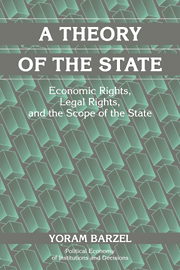Book contents
- Frontmatter
- Contents
- Preface
- 1 Introduction
- I The Emergence of Protection and Third-Party Enforcement
- II The Emergence of Legal Institutions
- 9 Legal Rights
- 10 The State's Enhancement of Market Trade
- 11 The Size and Scope of the State
- III The Character of the State
- References
- Index
- Other Books in the Series
10 - The State's Enhancement of Market Trade
Published online by Cambridge University Press: 04 December 2009
- Frontmatter
- Contents
- Preface
- 1 Introduction
- I The Emergence of Protection and Third-Party Enforcement
- II The Emergence of Legal Institutions
- 9 Legal Rights
- 10 The State's Enhancement of Market Trade
- 11 The Size and Scope of the State
- III The Character of the State
- References
- Index
- Other Books in the Series
Summary
CONDITIONS FOR LEGAL DELINEATION
In this chapter, probing further into the nature of legal rights, I first ask this: What characterizes assets that are exchanged by contracts, that is, by agreements enforced by the state? To qualify as contracts, agreements must satisfy certain requirements imposed by the state; they must not violate any law, they must involve quid pro quo, and so forth. In addition, in some cases the state may stipulate the registration of contracts and of properties. An agreement that satisfies these requirements is, therefore, a “legal” contract (though not necessarily a written document).
As long as contracts meet these requirements, the state does not take an active part in determining what goes into them. If the state is to enforce what the transactors choose to delineate, the transactors must provide sufficient information to enable the state to adjudicate in case of dispute. In addition, for the third party to be able to adjudicate disputes about the performance regarding an asset that is changing hands, the asset delineated in the contract must be matched to the recipient. The ease of matching will depend on the nature of the asset; matching unique assets is easier than matching generic ones. Among other attributes, the former can be more readily authenticated than the latter. The state may engage in authenticating ownership, but ownership can be authenticated by other means too. In the case of land, an ownership registry that matches individuals to parcels of land is usually maintained by the state. Authentication by a party other than the state also occurs – for instance, where appliance manufacturers serially number the appliances they produce, and then register the buyers. Ownership registration can reduce disputes and help settle them when they occur.
- Type
- Chapter
- Information
- A Theory of the StateEconomic Rights, Legal Rights, and the Scope of the State, pp. 185 - 197Publisher: Cambridge University PressPrint publication year: 2001

